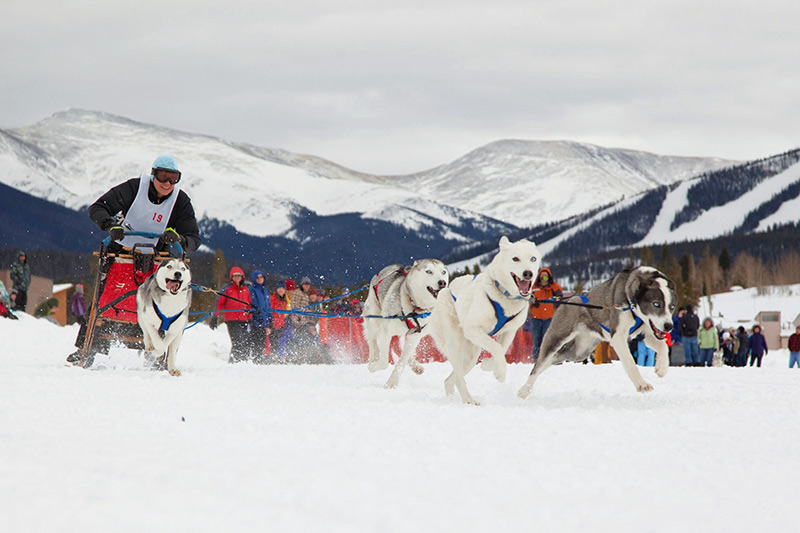Delta Pilot Prepares to Resume Dogsled Racing
By John Perkinson, Senior Staff Writer

F/O Anne Midkiff (Delta) competes with her canine team at a sled dog competition in Winter Park, Colo.
Exposure to a fascinating activity at an early age can often lead to a lifelong interest or pursuit. Like many ALPA members, F/O Anne Midkiff (Delta) developed a love of aviation from her exposure to flying as a young child. The Loveland, Colo., resident also had numerous early encounters with dogsledding. These days, she maintains a team of 11 purebred Siberian huskies, which she takes out for recreational rides as she prepares to resume competitive racing.
Dogsledding became popular during the Alaskan gold rush of 1896, providing prospectors with needed transportation into the wilderness. By the early 1900s, it became a common mode of winter travel in the northern regions of Canada and the United States as well as a form of recreation. Dogsledding has been a demonstration sport at the Olympics on several occasions, beginning with the 1932 Winter Olympics in Lake Placid, N.Y., but has never gained official event status.
Midkiff’s introduction to the sport came at a time when her family was living in Alaska. “My dad was a station manager for Air France and every two to four years we moved to a new location,” she recalled. “When I was about five, he was stationed in Anchorage. At the time, the airline’s B-747s were stopping there to be refueled before continuing onto the airline’s Asian markets.”
One of her father’s friends owned several dozen sled dogs, which he used to manage traplines for hunting. “We would take the dogs out, sledding up and down the traplines,” she said. “The adults would occasionally let me drive the sled, which I thoroughly enjoyed.”
Another of her father’s friends owned a Cessna 185 Skywagon with floats, and Midkiff spent many weekends venturing to remote, backcountry lakes. The adults would sometimes allow her to fly the aircraft. At age 14, while living in Germany, she began flying gliders as her fascination with aviation progressed.
A current member of the Colorado Mountain Mushers and the Rocky Mountain Sled Dog Club, Midkiff participated in more than a dozen local races in Colorado and Wyoming from 2011 to 2016. “It started off as a hobby,” she said, noting, “As a pilot with my previous airline, I had enough seniority that I could keep weekends free to compete in these events.”
Midkiff took part in competitions like the Grand Mesa Summit Challenge Sled Dog Race near Grand Junction, Colo., and the Snow Mountain Ranch Sled Dog Race near Granby, Colo. Her favorite contest is the Casper Mountain Sled Dog Races in Wyoming’s Beartrap Meadow, where she and her team have placed on several occasions.
When racing, Midkiff would occasionally come across moose, which don’t appear to like dogs. She also encountered a snowmobiler who was unfamiliar with or unwilling to concede the right of way.
During one racing heat, Midkiff’s sled crashed, causing her to lose her footing. “The first rule of dogsledding is that you never let go of the sled, no matter what happens,” she noted, adding, “The team dragged me a distance until my arms finally gave out and I had to let go.”
Clearly well trained, the dogs continued the race perfectly lined up and crossed the finish line. Meanwhile, their driver was left to walk the remaining several miles of the trail by herself. “Losing 150 pounds off the back of the sled, I’m sure my dogs were very excited,” she quipped.
While the Embry-Riddle grad’s canine family consists of 11 huskies, her primary racing team includes eight dogs. Her leaders’ names are Phanny Mae and L.B. The remaining six racers are Remi, Emma, Demon, Copper, Kenai, and Timber. Midkiff observed that the dogs receive a lot of love and attention, numerous breaks on race and training days, and plenty of healthy food.
For now, the A330 pilot can only hold lines of flying that include weekend trips, so she enjoys hobby running. She hopes that her carrier’s current practice of aggressive pilot hiring will allow her to return to sledding competitions by next winter. In the meantime, Midkiff trains twice a week, anticipating future races and the awards and honors she and her team will undoubtedly earn together.

